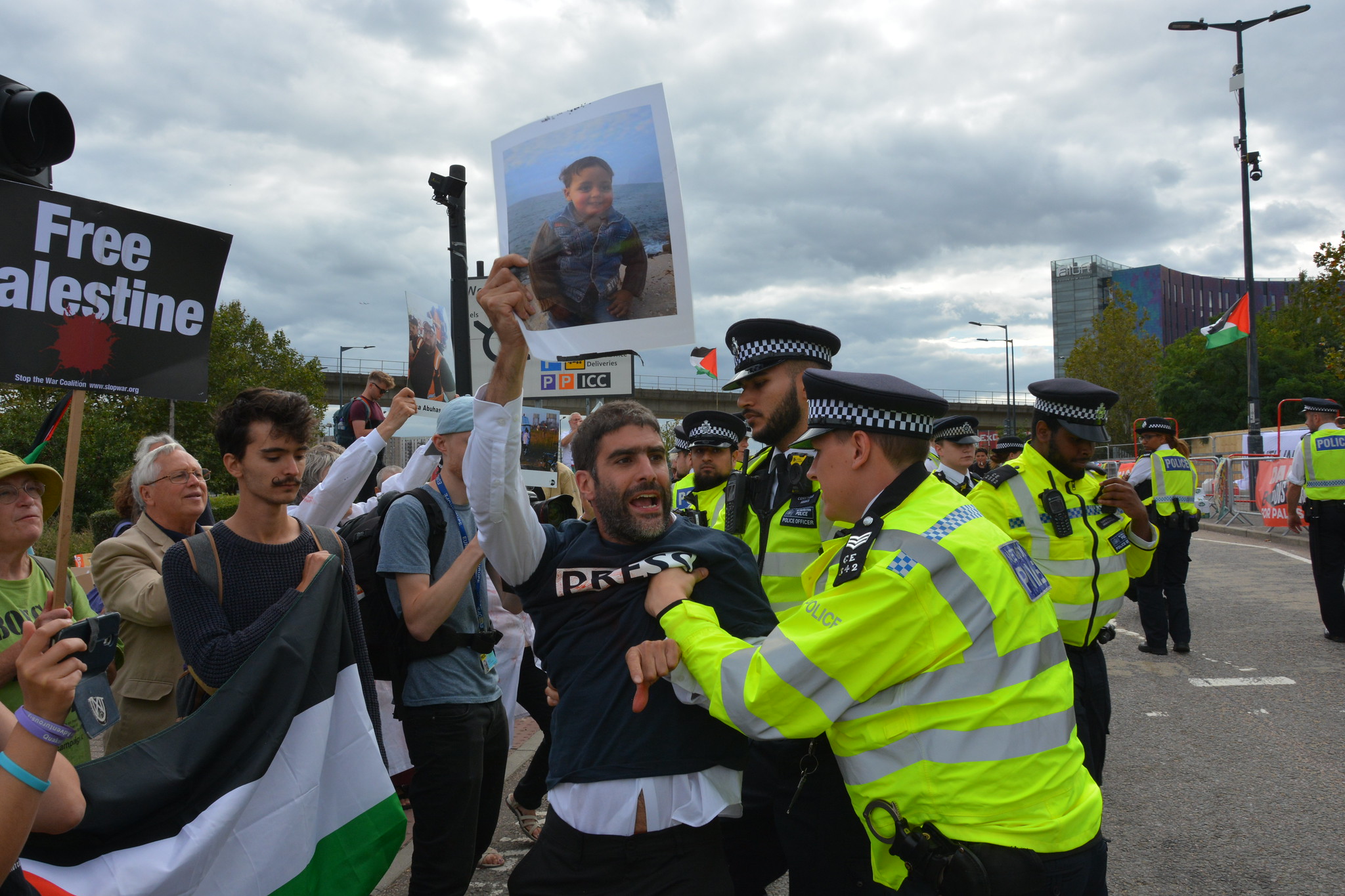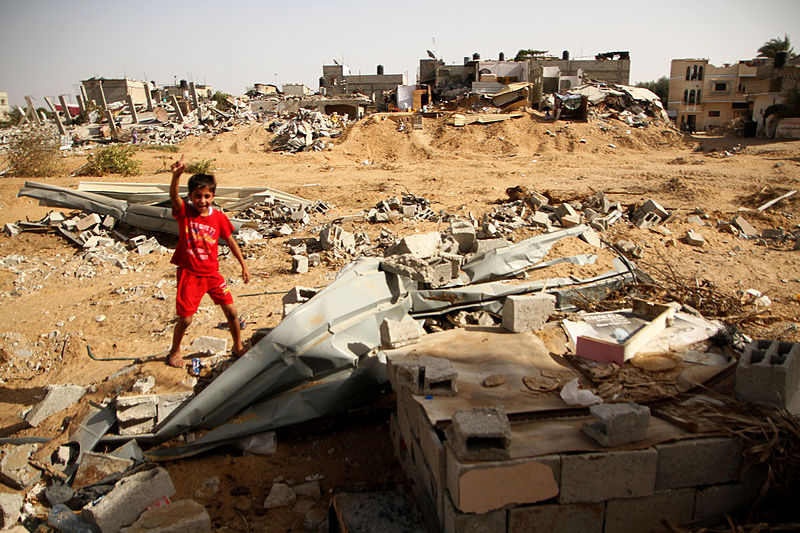What has been happening in Jerusalem over the past few weeks?
Built in 705 CE, Al Aqsa Mosque is the third holiest site in Islam and where thousands of Palestinians have been attempting to gather to pray during the holy month of Ramadan despite severe restrictions and state violence from the Israeli authorities. From erecting metal barriers in order to prevent Palestinians from gathering in the Old City, assaults on Palestinian Christians attempting to enter the Holy Sepulchre church during Easter to violent attacks by Israeli nationalist settlers chanting “death to Arabs.”
Worshippers also came to the Al Aqsa compound to peacefully support the residents of Sheikh Jarrah in East Jerusalem – under military occupation since 1967 – who were awaiting an Israeli court ruling that would see them forcibly evicted from their homes which would be given to Israeli settlers, in violation of International law and a move that the United Nations has described as a possible war crime. The day of the expected court ruling, Israeli nationalists were planning a triumphalist march through the neighbourhood in a provocative celebration of Israel’s occupation of Jerusalem in 1967.
In protesting against the planned evictions as well as 50 years of flagrant and daily abuses of human rights, hundreds of Palestinians were assaulted by Israeli forces who stormed the Al Aqsa compound, many using tear gas and rubber coated, steel bullets. Human rights monitors and reporters confirming cases of Palestinians who have lost eyes as a result of the attacks, and several with severe head injuries.
To date (Thursday 13th May 2021) reports confirm over 1,000 casualties in East Jerusalem, at least 56 deaths including 14 children.
Why are CAAT focusing on Israel?
Since the Conservative government was elected in May 2015, the UK has licensed over £400 million worth of arms to Israeli forces, including:
- £183 million worth of ML22 licences (military technology)
- £104 million worth of ML10 licences (Aircraft, helicopters, drones)
- £20 million worth of ML4 licences (Grenades, bombs, missiles, countermeasures)
- £4.6 million worth of ML6 licences (Armoured vehicles, tanks)
- £1.9 million worth of ML3 licences (ammunition)
- £1 million worth of ML1 licences (small arms)
In addition, the UK has issued 43 Open Licences in this period, which allow for unlimited exports. Moreover, the UK produces 15% of the value of every US F-35 stealth fighter produced, of which Israel has ordered 50, with 27 delivered so far. This suggests UK arms companies will have made hundreds of millions of pounds from these deliveries already. These sales are not included in the above figures, as UK components for the F-35 are covered by an indefinite, unlimited, Open General Export Licence.
According to an Israeli government spokesperson, Israeli F-35s took part in the recent attacks on Gaza.
Furthermore, this long-standing military support is underpinned by uncritical political support that appears set to deepen in the years ahead, with the UK and Israeli governments focused on establishing a post-Brexit free trade zone. There is no doubt that arms companies will be among the beneficiaries of this relationship, with the two governments having recently signed a military cooperation agreement to strengthen ties.
The biggest of these companies is Elbit Systems, which produces many of the drones used by Israeli forces – including the Hermes drone – and proclaims to provide the “backbone” of the Israeli Defence Forces (IDF). Elbit may be an Israeli company, but it and its offshoots have offices around the world, including here in the UK. It also enjoys a strong presence in terms of UK contracts, as one of the main contractors for the Ministry of Defence’s Watchkeeper drone programme and provides drones for UK ‘border security’ as part of the government’s campaign to demonise refugees crossing the Channel.
Regardless of how many atrocities have been inflicted – including Israel’s 51-day onslaught on Gaza in 2014 that resulted in the deaths of 2,200 Palestinians, a quarter of whom were children – Downing Street has continued to arm and support Israeli forces. UK-made arms have been used against Palestinians before, and it is likely that they will be again. These arms sales do not just provide military support–they also send a clear sign of political support for the daily abuse and violence that is central to upholding the occupation.
What is CAAT calling for?
CAAT is calling for a two-way embargo and for the UK to end arms sales and military support for Israeli forces. Since the Conservative government was elected in May 2015 the UK has licensed over £400 million worth of arms to Israeli forces, in addition to hundreds of millions of pounds worth of equipment covered by the secretive open licencing system, including components for the F-35.
These terrible air strikes have further added to many years of injustice and bloodshed. They must be met with condemnation, and action from the international community, particularly when following the increased tensions we have seen and the storming of such an important holy site.
Is CAAT being one-sided in our support?
The mainstream media is indeed talking about the events as “clashes between two sides” and this is exactly the narrative that the UK government would have us believe. This grossly misrepresents what is happening and what has been happening for over half a century: the Israeli state’s agenda to push indigenous people out of their homes, from land that is already recognised by the UN and the international community as belonging to the Palestinians.
Israel is therefore committing war crimes under international law as part of their ongoing, deliberate and systematic attempt to displace Palestinians from their land.
Article 49 of the Fourth Geneva Convention states that: “The Occupying Power shall not deport or transfer parts of its own civilian population into the territory it occupies.” It also prohibits the “individual or mass forcible transfers, as well as deportations of protected persons from occupied territory” and therefore, Israel’s policy of settling its civilians in occupied Palestinian territory and displacing the local population contravenes fundamental rules of international humanitarian law.
Israel’s state-led settlement programme includes the demolition of houses, the revocation of Palestinian residency rights as well as forced evictions.
What about Gaza?
The timeline for this week’s violence dates back to the occupation of Palestinian land in 1948 and the subsequent abuses of Human Rights, crimes of Apartheid and Persecution by the Israeli state.
Today, the Gaza Strip is home to a population of approximately 1.9 million Palestinians, which includes 1.3 million refugees. Blockaded by Israel, this 362 sq/km is one of the most densely populated areas in the world.
Israel maintains control over Gaza’s airspace and territorial waters and prevents the movement of Palestinians and essential goods from entering – including medical equipment, access to food & water as well as building construction equipment – resulting in over 56% of the population languishing in poverty.
This film gives an overview of the daily impact of the blockade.
The Gaza Strip is often linked to Hamas and the Western media’s rhetoric of terrorism, ignoring the daily suffering of a people who are unable to leave, starved and denied internationally recognised Human Rights solely based on their ethnicity.
The current bombardment of Gaza puts an additional strain on Gaza’s healthcare system, crumbling under the strain of Covid-19 and on the verge of collapsing. Palestinians have been excluded from Israel’s vaccination rollout, who, as an occupying force and under international humanitarian law, are responsible for the health of the population of those they occupy.
Why aren’t you calling for an arms embargo on Hamas?
The UK does not supply weapons to Hamas. Our aim is to apply international pressure to ensure that Israeli human rights violations and breaches of international law are brought to an end. Israel is in violation of over 60 UN resolutions, while its Occupation policies violate several articles of the Fourth Geneva Convention and a range of international human rights and humanitarian laws.
It is time for the UK government to signal its unwillingness to accept these ongoing and escalating war crimes, as well as ensure that UK companies do not profit from the humanitarian crisis that the Palestinians and others are currently experiencing.
Doesn’t Israel have a right to defend itself?
The UN Charter states that every country in the world has a right to defend itself within the bounds of international law and human rights conventions. However, Israel is using military force to maintain a blockade of Gaza and further its occupation of the West Bank that are illegal under international law.
In enforcing this occupation, Israel has consistently used disproportionate force, targeted civilians, used weapons that fail to distinguish between civilians and combatants, and engaged in collective punishment of civilian populations. These are violations of international law and are not covered by the right to self-defence.
Security is not achieved through military force. The only sustainable way to end the violence in Israel and the occupied territories is for Israel to end its blockade of Gaza and its military occupation of the West Bank.
Doesn’t the UK simply sell components of military hardware to Israel?
In today’s globalised arms industry, most major weapons systems are assembled from components sourced from several different countries. For instance, the Apache attack helicopters and its armaments, supplied to Israel by the United States, contain components from the UK, Norway and probably other European countries, as well as the USA.
The internationalism of such weapons doesn’t absolve the suppliers of parts from responsibility – a missile or an attack helicopter wouldn’t work without each part contained within it. The UK’s own export control regime recognises this fact: applying the same criteria to the export of components as to complete weapons. In practice, however, laxer standards are applied to the export of components. While the government usually shies away from selling UK-made guns and bombs to Israel, it knowingly licenses the export of their key components.
Israel is a major arms producer and exporter in its own right.
That is why CAAT is calling for a two-way embargo and an end to all military collaboration between the UK and Israel. Such an embargo would send a clear message that Israel’s continued control of the Occupied Palestine Territories, as well as its military actions, are unacceptable to the UK.
You can learn more here: Israel’s Occupation Continues Because Economic and Political Elites Around the World Benefit From It
If we didn’t supply Israel, surely someone else would?
It is no defence in any form of law to claim that someone else would have committed a crime if you hadn’t. It is also an argument for providing any country with arms, no matter how bad their human rights record.
Rather than racing other countries to the bottom in terms of human rights, the UK should be taking a lead in raising the floor upwards by taking its own arms export criteria seriously.
What effect would an embargo really have?
The UK is one of Israel’s closest political friends and economic allies. A signal such as an arms embargo would send a very strong message to Israel to abide by international law.
Moreover, it would mean that UK arms companies are not profiting from the misery of the Palestinians, and that the arms which the UK buys have not been tested on the Palestinians living under Occupation. In other words, the UK is not facilitating or benefiting from Israel’s violations of international law.
Are CAAT anti-Semitic?
CAAT works to stop the UK government exporting weapons to countries where they may exacerbate conflict, support aggression, increase tension and threaten social welfare.
CAAT campaigns to stop arms sales to the governments and regimes of Saudi Arabia, the USA, Hong Kong, Egypt, Bahrain, Nigeria (to name a few) as well as Israel.
CAAT is not anti-Semitic, not anti-Islamic nor anti any religion, ethnicity, race or creed.
We stand in solidarity with those being oppressed and strive to act in solidarity with all those experiencing state-led violence.
What can I do to support?
- Email your MP and demand they take action in Parliament to speak out.
- If you’re able to do so safely, join your local demonstrations. You can find more details here.
- Follow CAAT, War On Want, Palestine Solidarity Campaign and others on Twitter for other actions you can take in the coming days.
- Read and share our press release to raise awareness of the shocking scale of the UK arms trade with Israel and call on the UK government to end these sales: CAAT calls for investigation into if UK arms have been used in bombing of Gaza, CAAT call for UK to end arms sales and military support for Israeli forces
- Share our social media post on Twitter and Facebook to show your solidarity with Palestinians
- Join CAAT in taking on the power and influence of the arms trade? If you haven’t already, please sign up for email updates from CAAT and we’ll send you all the latest anti-arms trade news and campaign actions. You can also follow us on Facebook, Twitter and Instagram.
- And, if you’re able, please do donate towards our work.
Recommended Resources
Makan – What’s Happening in Jerusalem?
Middle East Eye – Sheikh Jarrah: Israeli Eviction Push Explained
IMEU – What is Happening in Sheikh Jarrah?
Visualizing Palestine – Jerusalem: A City For All?



